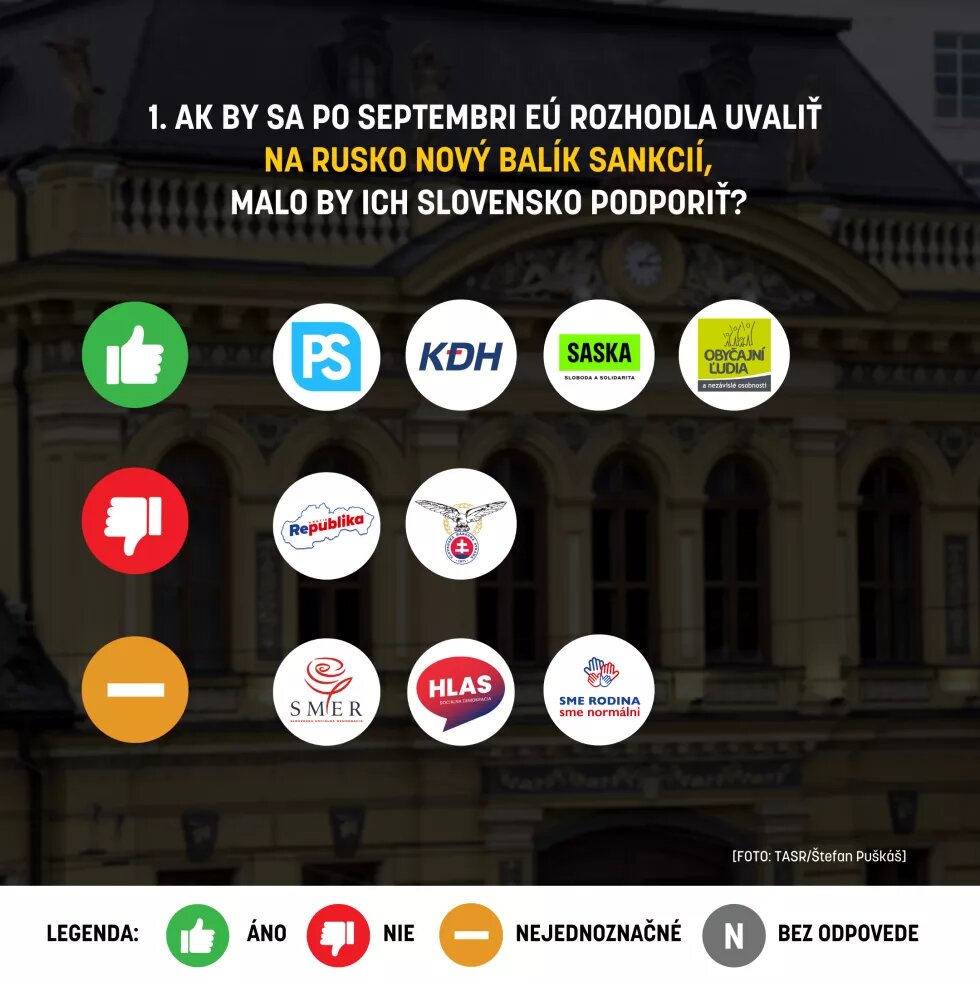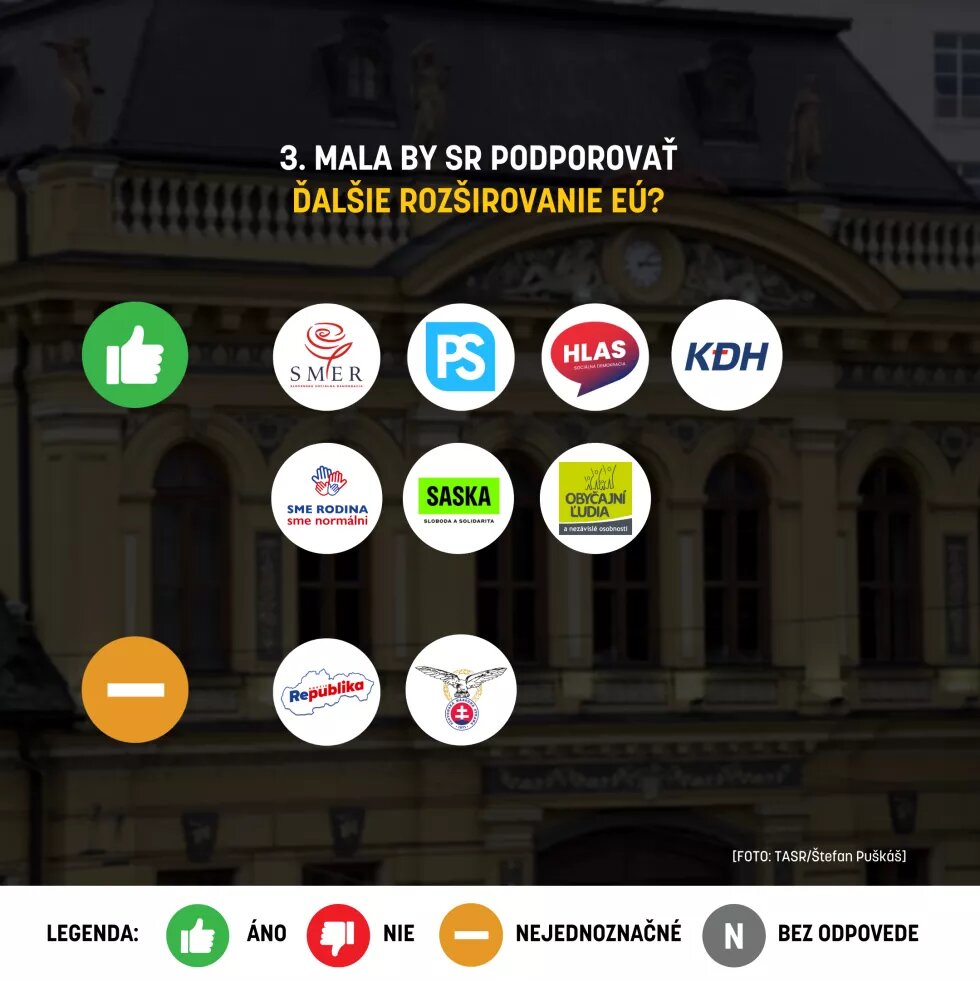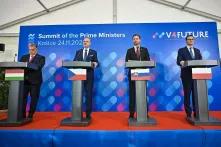
In the run up to the September parliamentary elections in Slovakia the editors of the EURACTIV Slovakia portal have prepared a series of analyses on how individual parties imagine their performance in a potential government. The analyses cover eight topics: the future of the EU, regional policy and EU funds, energy, foreign policy, defence and security, agriculture, human rights and industrial transformation.
The foreign policy analysis that is the subject of this article was made possible thanks to the support of the Heinrich-Böll-Stiftung Prague.

EURACTIV Slovakia analysed the positions of nine political parties, namely Smer-SSD, PS, Hlas-SD, Republika, Sme rodina, SaS, KDH, OĽaNO, SNS. Their selection was compiled according to the key of electability in the first five opinion polls of reputable agencies, starting from 1 July 2023. The analyses work with the programmes and programme theses of the political parties, as well as with media statements of their representatives, or with answers to questions sent directly to the parties.
Legend of the analyzed parties (sorted according to the latest polls):
1. Smer-SSD – Direction – Slovak Social Democracy (leader - Róbert Fico) – European affiliate of S&D Group
2. PS – Progressive Slovakia (Michal Šimečka) – Renew Europe
3. Hlas-SD – Voice – Social Democracy – (Peter Pellegríni) - S&D Group
4. Republika – Republic (Milan Uhrík) - Non-attached
5. Sme rodina - We are a family (Boris Kollár) - Identity and Democracy
6. SaS – Freedom and Solidarity (Richard Sulík) – ECR
7. OĽaNO – Ordinary People and Independent Personalities (and friends) (Igor Matovič) - EPP
8. KDH – Christian Democratic Movement (Milan Majerský) – EPP
9. SNS – Slovak National Party (Andrej Danko) - Non-attached
__________________________________
The foreign relations programmes of the political parties show rather their base values. However, they offer little vision of how to maintain or protect these values. The parties write about cooperation with Taiwan, protection of Christians and more women in embassies.
Foreign policy is not a top priority in the political programmes of the parties, but even in the run up to the September elections, Slovakia's world orientation is becoming the most important issue in the political struggle.
Programmes in this area are rather general and reflect the party's value anchoring. However, they also contain unique ideas. For example, Smer wants to "continue its foreign policy on all four cardinal points", which is also mentioned in Republika. The KDH would focus "especially on the protection of Christians" in the area of human rights at the international level. The PS proposes the appointment of a national coordinator to help with the reconstruction of Ukraine. Support for a shift from unanimous to majority voting on EU foreign affairs, for example, is no longer supported only by the Progressives, but is also discussed internally by SaS. Hlas mentions that it would like to get more women into diplomacy and ambassadorial posts.
However, the differences are more fundamental. EURACTIV looked primarily at four areas.
Relations with Russia
Russian aggression in Ukraine was the main topic of debate at most meetings at the ministerial level of the European group of twenty-seven, but also at all meetings at the level of government leaders - EU summits - basically since its outbreak in February last year. The member countries unanimously agreed on the condemnation of "unprovoked and unjustified Russian military aggression" against Ukraine, and gradually, on 11 packages of sanctions. The last one was approved by the countries in June of this year.
The sanctions are economic measures designed to weaken Russia's economic foundations, deprive it of critical technologies and markets, and severely limit its ability to wage war. European exports to Russia have been limited, and Russian oil (with limited exceptions), but also coal, steel, cement, asphalt, wood, paper, plastics, or gold, may no longer enter the Union. EU restrictive measures, related to the war in Ukraine, currently also apply to almost 1,800 individuals and entities, including President Putin, the head of diplomacy Lavrov, and all members of the State Duma. In addition to the travel ban, the countries of the Union restricted these individuals’ European assets worth more than 21.5 billion euros (which, for illustration, is almost as much as the European Commission intends to put into the fund for arms and military aid to Ukraine within upcoming four years).
According to Brussels, the sanctions clearly work. So far, they have limited Russia's political and economic growth, cut it off from key markets, increased the cost of doing business, and significantly reduced the country's industrial capacity. But there are also voices that claim that they damage the national economies of European countries “more than is necessary”. Thus, negotiations on the expansion of sanctions packages at the European level remain problematic – both, because of the individual countries' own, primarily economic interests, but also because of alleged pressure from Moscow on governments, where they can still have some influence. However, the Union is trying to act participially and continuing to impose economic pressure on the aggressor.
However, several sanctions may gradually expire in the upcoming months, and others will still need to be negotiated. That is also why we asked Slovak political parties with the potential to be in the parliament or the government after the September elections, whether they would support the approval of a new package of sanctions against Russia if the European Commission presented it.
Most of the political spectrum is inclined to the fact that Slovakia should be active in the negotiations but remain pro-European. It must communicate its red lines and interests - as all members of the Union do, after all - but it also must help find compromises in Brussels so that they use effective tools to pressure the Russians and ultimately not endanger the bottom of the well-known Maslow's pyramid - their own security.
In its program theses, Progressive Slovakia (PS) emphasizes that "thanks to the sanctions, Vladimir Putin has fewer means to buy weapons and recruit soldiers for his aggression". KDH even wants to "strive for the support of pro-democracy forces and the protection of human rights in Russia". They will support the sanctions as long as "legal grounds persist."
According to Juraj Droba, Foreign Relations Team Leader of the SaS party, the support for anti-Russian sanctions is unequivocal. "We rule out any separate bilateral agreements with the Russian Federation regarding the arrangement of Ukraine, or regarding the sanctions imposed on the Russian Federation," his party claims in its program theses. A justified extension of sanctions would also be supported by the OĽaNO movement, namely "with the aim of a peaceful resolution of the conflict with Ukraine". "Nevertheless, we will strive for dialogue with Russia, as it is historically and culturally connected to Europe," they added to the EURACTIV portal.
The parties Republika and SNS would not agree with the new package of sanctions against Russia, for Smer, Hlas and Sme Rodina, the answer is not clear.
Smer claims in the program that it wants to "evaluate (...) sanctions against any country in the world" on the basis of “effectiveness in achieving the intended goals and, in particular, on the basis of the economic and social impacts of sanctions on Slovakia." However, its representatives repeatedly let themselves be heard in the media that the already existing anti-Russian sanctions are harmful to Slovakia. The position of Hlas could be characterized similarly, although more pro-European. The latter is more lenient with regard to the justification of the current sanctions, but in media statements through his representatives he encourages a discussion about their form, as well as their effects. In the program, Pellegrini's party also emphasizes that "a strong and united EU must become a guarantor of compliance with international law and prevent its gross violation, as in the case of the Russian invasion of Ukraine." Sme rodina doesn't talk about the topic directly in the program either. However,
its chairman already claimed that the sanctions are "quite strict and enough for now", but also that "the Union must remain united, because it is the only language that Russia understands".
The Republika openly confirms in the program that it wants to "also develop trade relations with the Russian Federation". In the same way that Smer speaks primarily about Slovak interests during sanctions, Republika also does not mention the consequences of concessions to the aggressor: "We reject anti-Russian rage and sanctions and will work to improve relations with countries to the east of us, including improving relations with the Russian Federation," the extreme right writes in the program. In its public statements, the SNS emphasizes that Russia is still "not on its knees" despite multiple sanctions packages. According to Tomáš Taraba, who is running for the SNS party, this is an "unsustainable" model: “After the elections, Slovakia needs a government that will finally take the position of the Slovaks and not Ursula," said Taraba on the social network.
Qualified majority voting in the CFSP
According to the latest Eurobarometer in this area, up to 64 percent of Slovaks think that the voice of the European Union in the world counts and would even like to strengthen it. The common foreign and security policy (CFSP) of the bloc is supported by up to 70 percent. However, according to surveys, few of them realize how difficult it is to find absolute agreement among 27 countries on these topics.
Therefore, among member states and EU institutions, there is increasingly intense talk about changing the voting system in this area, or about expanding the list of areas in which a so-called qualified majority voting (QMV) would be sufficient. A qualified majority is achieved if 55 percent, i.e. at least 15 member states, vote for the proposal, and at the same time the proposal is supported by member states representing at least 65 percent of the total population of the EU. Apart from sensitive topics such as the CFSP, up to 80 percent of votes are taken in this way in the Council, that is, between countries.
Especially since the Russian invasion of Ukraine, the need for a unified voice of the Union on the world stage has proven crucial. However, 27 governments and country leaders always had to knock together a common approach, and compromises were not easy to find. At the same time, we heard, for example, about the blocking of the expansion of sanctions by specific countries, and it is questionable whether the bloc will not find itself in such a difficult situation in the future that its steps will be vetoed by one member. According to many, it would therefore help to increase the effectiveness of European foreign policy, as well as the speed of responses to external crises. On the other hand, decisions based on a qualified majority would not allow the veto and change the dynamics of the negotiations. Diplomacy would have to be much more active and large countries could begin to dominate foreign policy issues. Especially the smaller states, such as Slovakia, fear that their voice would be lost among stronger and larger countries.
In order to change the way of voting in the CFSP, the EU treaties would have to be changed as well. Therefore, we also asked Slovak political parties how they approached this dilemma.
The majority of the Slovak political spectrum is against the transition to QMV. According to Monika Beňová, SMER-SSD will continue to push for unanimous voting. The party is "convinced, based on many years of experience, that every single member state should decide on this important policy". Hlas would also give a clear "no" to the proposal. Karol Farkašovský from SNS and the OĽaNO movement similarly confirmed the rejection of their clubs.
Since the Republika talks in the program about "a return to an exclusively economic association of sovereign nation-states," - which, if it could not be achieved, the party is "ready to initiate a referendum on the withdrawal of Slovakia from the EU" - even in this case, QMV's support would not pass. The KDH would also be against it, for which it is "extremely important that (in the EU) it is clearly respected which competences are exclusive competence of the member states and which are transferred to the EU by the will of the citizens".
The PS and, surprisingly, the SaS would be in favour of the change, or the discussion about the change. Juraj Droba confirmed for EURACTIV that this method of solving external EU issues would, in the opinion of the majority in the party, "eliminate several risks". Liberals have so far strongly opposed the idea of QMV, however a stronger “pro-european” voices gathered on the candidates list, EURACTIV was confirmed. PS would support the transition to majority voting "in selected areas of foreign and defence policy". "The fact that in recent years we have experienced uncountable number of steps taken by Hungary to block sanctions, is a clear proof that at this stage the persistent insistence that we have to make decisions only on the basis of consensus is becoming a problem for Slovakia,” Tomáš Valášek said.
Enlargement of the EU
In the EU, the expansion of the bloc has essentially been an unstoppable topic, especially after its biggest wave in 2004, when Slovakia also joined the bloc. Although this step with the accession of a dozen new members brought great benefits to the 15 ”older” members, there has also been a significant “enlargement fatigue” among Western countries, which did not seem to pass even during the gradual admission of three more states.
Eight countries currently have candidate status: Albania, Bosnia and Herzegovina, Moldova, Montenegro, North Macedonia, Türkiye and Ukraine. The so-called potential candidates are discussed in the case of Georgia and Kosovo. The countries of the Western Balkans are the closest to access, especially Serbia and Montenegro, which managed to open a number of negotiation chapters in fulfilment of the Copenhagen criteria but closed two in the case of Belgrade and three in the case of Podgorica. Negotiations with Türkiye have been suspended in 2016 due to problems with democracy and the rule of law.
While the head of the European Council, Charles Michel recently said that the bloc could be ready for a wave of new expansion as early as 2030, the European Commission questioned these statements. According to the executive body, the EU "does not focus on dates, but on the readiness of the candidate countries". However, European Commissioner for Enlargement Oliver Várhelyi said in a recent interview that the Commission is ready to present a "fundamental proposal" that could strengthen the enlargement process, for example, with new investments directly in the Western Balkans. Frustration from the slow process (for example, Türkiye has had candidate status since 1999, North Macedonia since 2005) causes political friction among the candidates and may encourage the efforts of players such as Russia or China to gain a stronger influence.
Slovakia, which has its own difficult experiences with negotiations and joining the Union, has traditionally been a supporter of its expansion. And according to the programs and statements of the Slovak parties, this line will probably be followed even after the September elections.
Only the Republika and the SNS have an ambiguous position, which would first prefer to reform the block itself, and then open it up: "Although from an economic point of view, expanding the EU to include new markets would make sense, we are convinced that the EU should first consolidate, reform and resolve internal problems," said Marián Ďuriš, chairman of the Republika's expert team for Foreign Affairs of the party.
The rest of the political spectrum is in favour of expansion after the criteria are met. Hlas does not address the expansion in the program, but the head of the chapter, Peter Kmec, confirmed to EURACTIV a clear "yes". The situation is similar with SaS, Sme rodina, or OĽaNO, which told the portal that it also supports the "gradual integration of Ukraine into the EU" and is "ready to discuss the expansion of the EU to include other countries." KDH would support the expansion and proposes to apply "the procedure of creative integration into the EU institutions and the single market", but the party does not specify what should be more precisely.
Tomáš Valášek from the PS said in a podcast of the EURACTIV that although his party clearly supports enlargement, he fears that "Ukraine is years, if not a decade, away from joining the EU." Furthermore, Progressives would also have a problem with Türkiye, which, according to Vice President Valášek, "does not meet the standards of modern democracy." However, if Ankara wanted to modernize the agreements on the Customs Union with the EU - which is of great interest in Türkiye, but the EU had been waiting for the results of the May elections -, according to Valášek, the PS would say: "let's do it, sure, that's not a recognition of the non-existent democratic of Turkey's progress." Expansion towards Türkiye should also “be stopped” according to the KDH program.
Cooperation with China
After the United States limited its activities in China, in 2020 the European Union became the largest trading partner of this Asian power and vice versa. Every day, the bloc exchanges goods worth up to 2.3 billion euros with China (which, for comparison, is about the size of the estimated wealth of former US President Trump). Most of this trade is represented by industrial products.
For Slovakia, China is still the largest trading partner among Asian countries. Last year, it slightly exceeded ten billion euros, while representing 5.3 percent of Slovak exports. However, Slovakia's latest Security Strategy from 2021 emphasizes that China is a partner, competitor, but also a systemic rival for the country, in line with EU policy. The bloc is currently continuing to prepare and implement measures to prevent non-democratic regimes from gaining access to the bloc's critical infrastructure, as well as other essential technologies that could threaten its economic security, such as AI and 5G.
For this reason, in March, measures to check and possibly ban foreign investments began to apply in Slovakia, which were supposed to follow the strategic interests of the country and the bloc in the context of security, in line with EU policy. However, the country still lacks a formalized Asia-Pacific strategy or a plan for building relations with individual states in the region, the Central European Institute for Asian Studies points out.
Slovak political parties do not specifically focus on China and building relations with it, but the openness of their approach to this world power may also indicate ambitions to remain an important ally of Brussels in the event that other countries begin to "play" with Beijing much more intensively. The question for the parties and their programs in our analysis was, therefore, whether Slovakia should be more active in cooperation with China?
The Christian Democrats (KDH) see China as a "complex threat to the democratic world" and would push for "diversification and the protection of the single market, along with the protection of critical infrastructure and the intellectual property of our companies" in the new government. The PS says that as part of the government, it would support the European line and establish "flexible, thematic partnerships with like-minded countries in terms of European, trade, environmental or security policies". Similarly, according to Juraj Droba from SaS, "the current range of activities is adequate".
According to OĽaNO, cooperation with China is "important, especially from an economic point of view, but this point of view should not completely give way to the value orientation of foreign policy". However, the movement would deepen cooperation with Taiwan, "especially in the field of technological development, while it is in our interest to support the conclusion of a bilateral investment agreement at the EU level." In Slovakia, they would even like to attract Taiwanese chip production, which should also have a hub in Europe.
Hlas and Peter Kmec are in favour of strengthening cooperation, but "in line with the EU's common position". Sme rodina, whose chairman visited China in April, says that he is "very interested" in the fact that goods bound for the EU transit at least through Slovakia, "because we can profit very well from this". The Republika movement is also "for" the expansion of cooperation, which according to its program "perceives the gradual shift of the world's geopolitical and economic centre of gravity to the Asia-Pacific region", as well as nationalists from the CIS.
The article was originally published on euractiv.sk.
This is edited machine translation from Slovak language.





